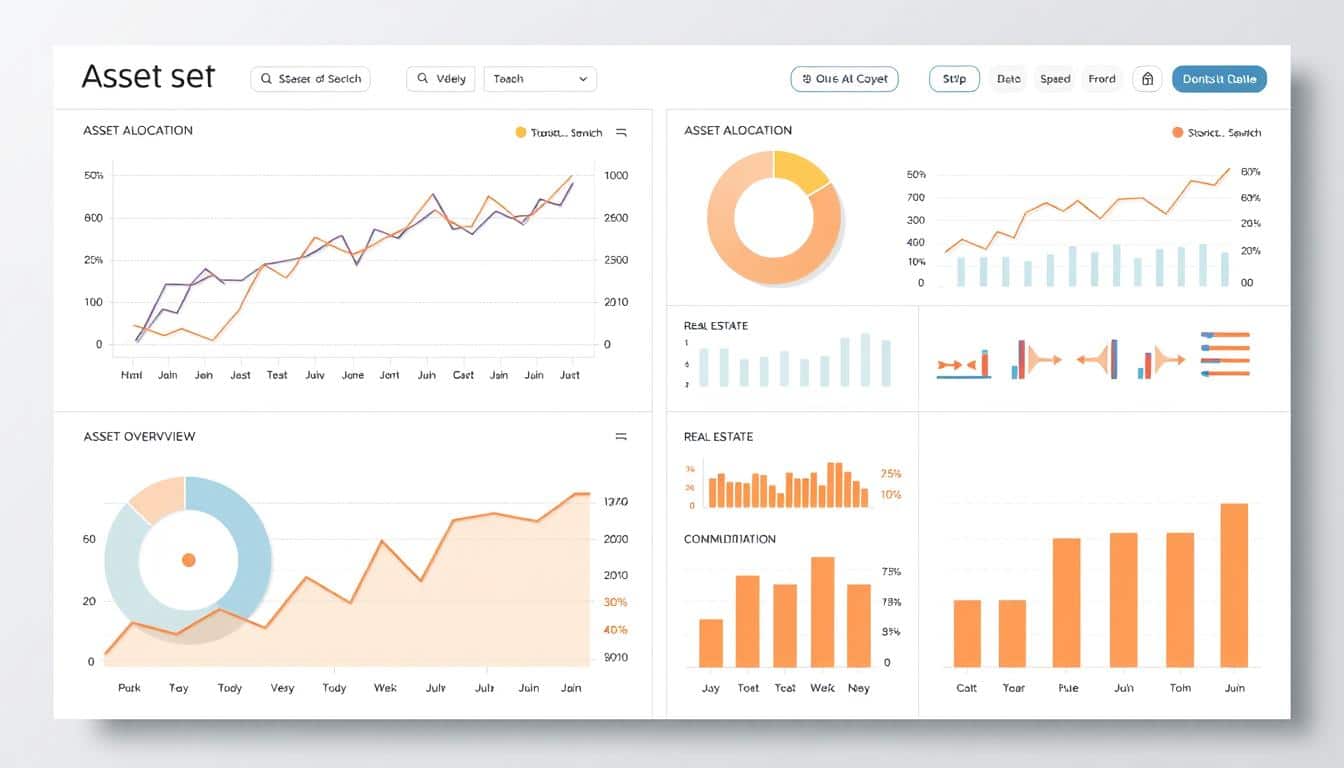Budgeting is key for anyone aiming for financial health and stability. It helps people take control of their finances, moving beyond living paycheck to paycheck. Smart budgeting lets you manage your money to support your goals and save better.
This leads to more than just short-term relief. Ultimately, you’ll enjoy freedom from financial worries and a smoother path to good financial health.
Anúncios
Understanding Your Financial Health
To achieve financial success, one must understand their financial health. This means keeping track of money earned and spent. By monitoring your finances closely, you become more aware. This awareness helps you make better financial choices. Having a strong plan for your money is crucial for managing short and long-term finances.
Importance of Tracking Income and Expenses
Knowing where your money goes is key to stability. By checking on your income and spending regularly, you can:
- Identify spending patterns
- Recognize opportunities for saving
- Stay within budgetary limits
This active approach gives you control over your finances and boosts your financial knowledge.
Benefits of a Good Financial Strategy
A clear financial plan leads to reaching your goals. Understanding what’s important financially allows people to:
- Allocate resources wisely
- Develop healthy spending habits
- Mitigate unnecessary expenditures
These steps ensure stability in the long run and build confidence in financial decisions.
![]()
Adequately Assess Your Needs and Wants
It’s crucial to know the difference between needs and wants for budgeting. Needs like rent, utilities, and food are essentials. Wants are things like eating out or going to movies. Knowing this helps you handle your money better.
Defining Essential vs. Discretionary Spending
Knowing what you really need helps you focus on important expenses. It’s easy to mix up needs with wants otherwise. Wants can enhance our lives but should be balanced to keep finances healthy.
Strategies to Evaluate Personal Priorities
Checking what you spend money on helps meet your financial goals. This process can pinpoint where to cut back on extras without losing happiness. Here are ways to do it:
- Review your spending each month by category.
- Have clear financial goals to shape your spending.
- Find things you don’t need to sell for extra cash.
Popular Budgeting Methods That Work
Finding the best budgeting methods is key to keeping your finances in good shape. There are many strategies you can use to organize your money better. Here are some good options to think about.
The 50/20/30 Budgeting Rule
The 50/20/30 rule makes budgeting clear by dividing your income into three parts. First, 50% goes to must-haves like rent and food. Next, 20% is for saving for emergencies and your future.
Finally, 30% is for fun things like movies and hobbies. This plan helps you spend wisely but still enjoy life.
Using the Zero-Based Budget Method
The zero-based budget helps you use every dollar wisely. You start by listing all the money you make and spend. Make sure every dollar has a job, whether it’s for bills, saving, or other costs.
This approach makes you more responsible with your money and helps achieve your financial goals.
Exploring the Envelope Budget Technique
The envelope method uses cash envelopes for budgeting. You put cash in envelopes for things like groceries and fun. It helps you spend carefully.
When an envelope is empty, you stop spending in that category. It’s a great way to avoid wasting money on things you don’t need.
Building an Effective Budget Plan
Making a monthly budget is key to financial stability. It acts as a guide to manage what you earn and spend. By following a plan, you gain control over money and progress toward your financial dreams.
Steps to Create Your Monthly Budget
Here are the steps to make a good monthly budget:
- List every way you make money, like jobs, bonuses, and extra work.
- Sort all your monthly bills, telling apart needs from wants.
- Always pay for necessary things like home, water, and food first.
- Put some money into savings, thinking about your future goals.
- Use some money for fun stuff, but don’t go overboard.
Setting Realistic Financial Goals
Having real goals can motivate you while making a budget. Keep these tips in mind:
- Think of short-term goals, like saving for a trip or emergencies.
- Plan for medium-term goals, such as getting rid of credit card debt or saving for a big buy.
- Consider long-term goals, like saving for retirement or buying a house.
Pay Yourself First: A Smart Strategy
Putting money into savings first is a key part of smart money management. This method doesn’t just help you save; it also teaches you to be disciplined with your money. By setting aside a part of your income for savings before anything else, you slowly build a strong financial base.
Understanding the Pay Yourself First Concept
The main idea of paying yourself first is simple. Every time you get paid, you save a specific amount before spending on anything else. This makes saving a priority rather than an afterthought. It ensures saving money becomes a regular part of managing your money and helps avoid overspending.
Benefits of Saving Before Spending
Starting with savings has many pluses. Some of the top benefits are:
- Increased savings rate: Saving first means your money grows quicker, helping you meet your financial dreams sooner.
- Prioritized financial security: Regular saving means you’re always ready for emergencies or big buys.
- Improved budgeting: Planning your spending around your savings gives you a better overview of your finances.
Making Budgeting a Habit
Making budgeting a habit is key to having good money health. Having regular checks helps watch progress toward money goals. It lets you adjust plans when needed. Thinking of budgeting as an ongoing action can bring stability and control over money.
Regular Check-Ins to Monitor Progress
Checking your budget often gives insight into how you spend. Planning checks every month or two helps keep track of finances. When reviewing, think about:
- Seeing if you’re meeting your financial goals.
- Finding ways to save money.
- Changing plans due to new expenses or income.
Cultivating Discipline for Long-Term Success
Being disciplined about money is key to keeping a budgeting habit. It means sticking to a plan even when it’s hard. To develop discipline, you need to:
- Create spending limits that fit your earnings.
- Be honest with yourself about your spending.
- Celebrate progress to stay motivated.
Managing Debt and Savings Effectively
Managing your debt and savings is crucial in your overall financial plan. Repaying debt should be a top priority, especially the ones with high interest. Having a good plan for savings, like setting up an emergency fund, also helps protect against unexpected costs.
Prioritizing Debt Repayment in Your Budget
Mixing debt management into your budget makes for a more stable financial life. Here are key steps to take:
- List your debts by interest rate.
- Make a budget that puts aside money for debt payment.
- Pay off high-interest debts first but keep up with smaller payments on others.
Building an Emergency Fund for Unexpected Expenses
An emergency fund acts as a safety net for surprise expenses. You should try to save up three to six months’ worth of expenses. This way, you won’t have to use credit cards in a pinch. Here’s how to start your emergency fund:
- Decide on a savings target based on your monthly costs.
- Open a separate account for your emergency savings to easily keep track of it.
- Regularly add a set amount to your fund until you hit your goal.
Adapting Your Budget for Life Changes
Life often brings changes that affect how we handle our money. Knowing when to tweak your budget is key. It helps you handle unexpected costs and income shifts. Two big points to watch are seasonal costs and changes in what you earn each month.
Considering Seasonal Expenses
Year-round, some costs come back again and again, affecting your finances. Expenses like getting ready for school, buying gifts, or taking trips need careful planning. Here’s how to do it:
- Create a calendar for seasonal costs to keep track of what’s coming.
- Put aside money every month to make these expenses less stressful.
- Use a flexible budget to manage your spending during these high-cost periods.
Adjusting for Changes in Monthly Income
Sometimes, our income changes due to a new job, a promotion, or even a surprise bonus. Updating your budget for these shifts can keep you financially sound. Here’s what to do:
- Keep an eye on how much money you make and note any changes.
- Rework your budget with your new income, starting with the must-haves.
- Adopt a flexible budgeting approach to deal with the unforeseen.
Conclusion
Mastering budgeting is key to financial health and stability. A well-rounded budget helps people understand their money better. This sets the stage for good financial management.
By monitoring spending and knowing what’s necessary, one can spot where to cut back. Trying different financial methods like the 50/20/30 rule or zero-based budgeting fits personal financial aims. Saving regularly reduces stress and prepares for surprise bills.
Being dedicated to budgeting and flexible can improve anyone’s finances, helping them face monetary challenges and securing a better future. A solid financial plan is crucial for lasting success and well-being.
FAQ
What is the importance of budgeting for financial health?
How can tracking income and expenses help me?
What are essential and discretionary expenses?
What are some popular budgeting methods?
How do I create a monthly budget?
What does the “Pay Yourself First” strategy mean?
Why is it important to make budgeting a habit?
How can I effectively manage debt while saving?
How should I adapt my budget for life changes?
Content created with the help of Artificial Intelligence.



